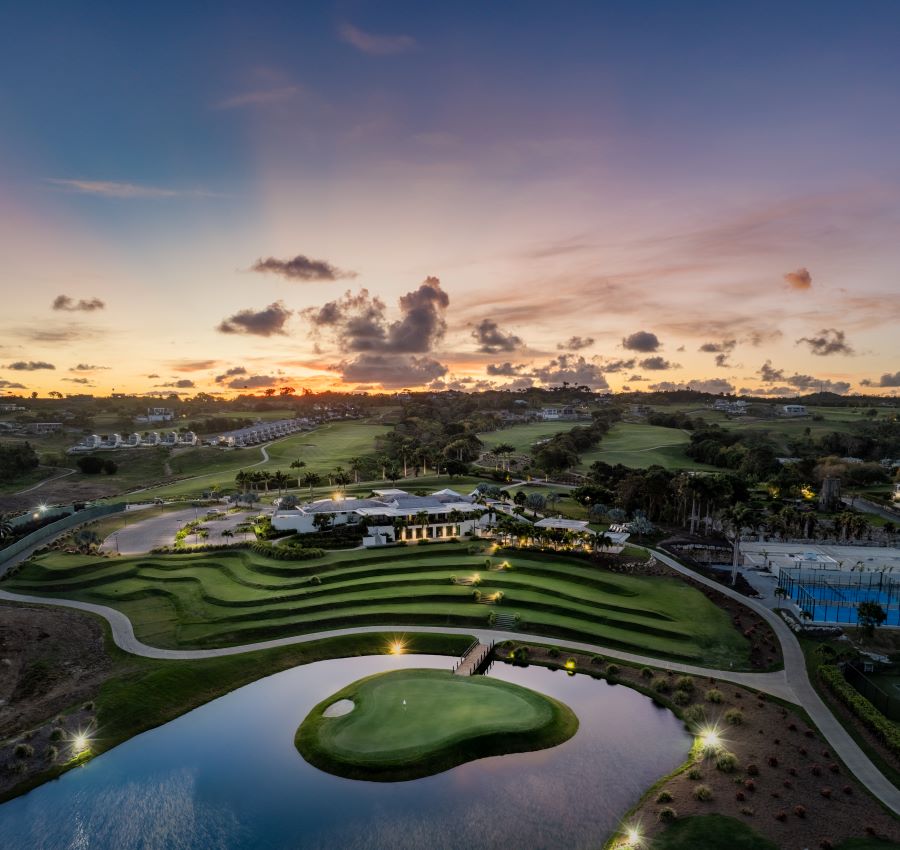In recent years, luxury golf resorts have stepped up their commitment to sustainability, aiming not only to offer world-class facilities but also to protect the environment and contribute to the well-being of surrounding ecosystems. A key marker of this dedication is certification by organizations such as Audubon International, which provides rigorous environmental standards for golf courses and resorts. Following are three top-tier resorts—Apes Hill Barbados, St. Regis Bahia Beach, and Big Cedar Lodge—that have been leading the way in eco-friendly practices while offering unforgettable golf experiences.
Apes Hill Barbados: Caribbean Elegance with a Green Heart
Location: St. James, Barbados
Audubon Certification: Certified Audubon Cooperative Sanctuary
Nestled on the lush island of Barbados, Apes Hill offers more than just breathtaking views of the Caribbean Sea, Atlantic Ocean, and rolling fairways. The blossoming resort and residential community is designed with sustainability at its core, ensuring that golf, real estate, and luxury lifestyle can thrive without harming the local environment.
Sustainability is a way of life at Apes Hill. With 60 acres dedicated to farming livestock, 40 beehives, vegetable gardens, and 17 acres for fruit trees, it is dedicated to preserving biodiversity. Planting passion fruit, lime trees, and other local trees helps reinforce a vibrant ecosystem. An abundant garden provides many items used in the first-class cuisine served at Apes Hill.
Apes Hill rests along the Barbados Ridge Accretionary Prism, a remarkable underwater mountain range that stretches from Trinidad to Puerto Rico. This geological wonder, one of the few exposed accretionary prisms on Earth, unveils a world of unparalleled vistas and a rich tapestry of natural history.
Sustainability and Environmental Practices:
- Water Conservation: Apes Hill takes advantage of advanced water management techniques, including an efficient irrigation system that significantly reduces water consumption on its golf course. Rainwater is also harvested and reused for landscaping via a reservoir that holds up to 58 million gallons and is used to help fully irrigate the resort.
- Native Vegetation and Biodiversity: The resort actively protects the surrounding tropical forests, preserving native flora and fauna. It has reintroduced native plants to enhance local biodiversity, creating a haven for birds, bees, and butterflies.
- Eco-Friendly Turf: Their golf course uses drought-resistant grasses to minimize water and chemical use. This aligns with their goal of reducing chemical runoff and promoting a healthy ecosystem around the resort.
- Wildlife Habitat Creation: Apes Hill has dedicated areas within the resort to fostering wildlife, particularly birds, which thrive in the carefully maintained natural surroundings.
This holistic approach has earned Apes Hill its recognition as a Certified Audubon Cooperative Sanctuary, cementing its status as one of the Caribbean’s top sustainable golf resorts.
St. Regis Bahia Beach: A Green Paradise in Puerto Rico
Location: Río Grande, Puerto Rico
Audubon Certification: Certified Audubon International Signature Sanctuary – Gold Level
The St. Regis Bahia Beach Resort, nestled between lush tropical forests and pristine beaches, has set the standard for eco-luxury in Puerto Rico. This resort is the first in the Caribbean to earn Gold Level Signature Sanctuary status from Audubon International, a prestigious accolade recognizing its exemplary environmental stewardship.
Sustainability and Environmental Practices:
- Eco-Architecture: The resort was designed with the environment in mind, ensuring minimal disruption to the surrounding ecosystem. Structures are built in harmony with the natural landscape, and extensive use of recycled materials further minimizes environmental impact.
- Mangrove Conservation: The resort actively protects and restores vital mangrove ecosystems, which serve as crucial buffers against storm surges and provide habitats for a variety of wildlife, including endangered species.
- Organic Landscaping: Landscaping across the resort is maintained with organic practices, eliminating the use of harmful pesticides and fertilizers. This helps to preserve the quality of nearby water sources, including the river and ocean surrounding the resort.
- Energy Efficiency: St. Regis Bahia Beach employs solar energy and energy-efficient lighting across its grounds, drastically reducing its carbon footprint while providing luxury to its guests.
- Sustainable Golf Course Management: The Robert Trent Jones Jr.-designed golf course is carefully managed to promote wildlife, reduce water usage, and ensure the health of the local ecosystem. The resort has also reforested large sections of the property, increasing tree coverage and improving air quality.
These thoughtful and forward-thinking environmental efforts make St. Regis Bahia Beach a model of sustainable tourism in the Caribbean, offering visitors both a luxury experience and an opportunity to support meaningful ecological conservation.
Big Cedar Golf: A Green Haven in the Ozarks
Location: Ridgedale, Missouri
Audubon Certification: Certified Audubon International Signature Sanctuary
Big Cedar Lodge, situated in the heart of the Ozark Mountains near Branson, is not only renowned for its natural beauty but also for its commitment to sustainability. Founded by conservation-minded Bass Pro Shops CEO Johnny Morris, the resort has five golf courses and all have embraced environmentally responsible practices throughout their operation. Its lodging properties, also branded as Johnny Morris Nature Resorts, have recently achieved Audubon International Green Lodging certification, as well.
Sustainability and Environmental Practices:
- Restoration of Natural Habitats: Big Cedar Lodge actively restores and preserves natural habitats across its vast grounds. Through the reintroduction of native grasses, trees, and plant species, the resort has helped revitalize local ecosystems and protect wildlife.
- Water Conservation: The resort features state-of-the-art irrigation systems that ensure responsible water usage on its five golf courses. They have also implemented stormwater management techniques to prevent runoff from damaging local waterways.
- Wildlife Corridors: Big Cedar Lodge prioritizes the protection of local wildlife by creating corridors that allow animals to safely navigate the property. This approach helps maintain biodiversity while reducing the human impact on local species.
- Renewable Energy: Solar panels and other renewable energy sources power much of the resort’s operations, including its golf facilities. This commitment to clean energy significantly reduces its overall environmental footprint.
- Sustainable Building Materials: Many of the structures at Big Cedar Lodge have been constructed using sustainable materials, from reclaimed wood to locally sourced stone. This reduces the carbon emissions associated with transportation and construction.
Big Cedar Lodge’s approach to sustainability demonstrates a deep commitment to preserving the natural beauty of the Ozarks for future generations. Its eco-friendly practices have rightfully earned it a spot among the top sustainable resorts in the United States.
More than Just Golf Resorts
Apes Hill Barbados, St. Regis Bahia Beach, and Big Cedar Lodge are more than just golf resorts; they are examples of how the luxury tourism industry can embrace sustainability and environmental stewardship. Through certifications by Audubon International and a range of innovative practices, these resorts have set a high bar for balancing eco-consciousness with world-class leisure and golfing experiences. Whether you’re an avid golfer or a nature enthusiast, these resorts provide the perfect getaway where luxury meets environmental responsibility.
MEDIA CONTACT:
Dan Shepherd, +1 703-403-5317, dan@danshepherdpr.com





